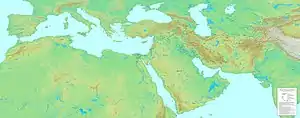Divisions of the world in Islam
In classical Islamic law, the major divisions are dar al-islam (lit. territory of Islam/voluntary submission to God), denoting regions where Islamic law prevails,[1] dar al-sulh (lit. territory of treaty) denoting non-Islamic lands which have concluded an armistice with a Muslim government,[2] and dar al-harb (lit. territory of war), denoting adjoining non-Islamic lands whose rulers are called upon to accept Islam.[3]
| Part of a series on |
| Islam |
|---|
 |
|
The Arabic singular form dar (دار), translated literally, may mean "house", "abode", "structure", "place", "land", or "country". In Islamic jurisprudence it often refers to a part of the world.
The notions of "houses" or "divisions" of the world in Islam such as Dar al-Islam and Dar al-Harb does not appear in the Quran or the Hadith.[4] According to Abou El Fadl, the only dars the Qur'an speaks of are "the abode of the Hereafter and the abode of the earthly life, with the former described as clearly superior to the latter".[5]
Early Islamic jurists devised these terms to denote legal rulings for ongoing Muslim conquests almost a century after Muhammad. The first use of the terms was in Iraq by Abu Hanifa and his disciples Abu Yusuf and Al-Shaybani. Among those in the Levant, Al-Awza'i was leading in this discipline and later Shafi'i.
The concept of dar al-harb has been affected by historical changes such as the political fragmentation of the Muslim world, and has little significance today.[3] The theoretical distinction between dar al-Islam and dar al-harb is widely considered inapplicable, and many contemporary Islamic jurists regard the West as part of the former, since Western Muslims can freely practise and proselytize their faith.[6]
Major religious divisions

Dar al-Islam
Dar al-Islam (Arabic: دار الإسلام literally house/abode of Islam or Dar al-Tawhid, house/abode of monotheism) is a term used by Muslim scholars to refer to those countries where Muslims can practice their religion as the ruling sect. It is the area of the world under the rule of Islam, literally, "the home of Islam."[7]
Dar al-Islam, or house/abode of Submission, is also known and referred to as Dar al-Salam, or house/abode of Peace. The term appears in the Quran in 10.25 and 6.127 as a name of Paradise.[8]
According to Abu Hanifa, considered to be the originator of the concept, the requirements for a country to be part of Dar al-Islam are:[9][10]
- Muslims must be able to enjoy peace and security with and within this country.
- The country should be ruled by a Muslim government.[11]
- It has common frontiers with some Muslim countries.
Dar al-Harb
Dar al-Harb (Arabic: دار الحرب "house of war"). Dar al-Harb is a term classically referring to those countries which do not have a treaty of nonaggression or peace with Muslims (those that do are called Dar al-'Ahd or Dar al-Sulh).[12]
According to Majid Khadduri, the fundamental distinction between Dar al-Islam and Dar al-Harb was introduced after the defeat of the Umayyad Caliphate at the Battle of Tours in 732 which prevented the expansion of Islam to the north, while at the same time the expansion of the caliphate to the east had been halted.[13]
Wahbah al-Zuhayli argues that the concept of Dar al-Harb is mostly historical: "The existence of Dār al-Islām and Dār al-Ḥarb in contemporary times is rare or extremely limited. This is because Islamic countries have joined the United Nations covenant that stipulates that the relationship between nations is peace and not war. Therefore non-Muslim countries are Dār al-‘Ahd …"[14]
Dar al-'Ahd, Dar al-Sulh
Dar al-'Ahd (Arabic: دار العهد "house of truce") or Dar al-Sulh (Arabic: دار الصلح "house of conciliation/treaty") are terms used for territories that have a treaty of non-aggression or peace with Muslims.[12]
This designation can be found in the Quran, where Muslims are directed on how they should act in war:
"Excepting those who join a people between whom and you there is a treaty, or such as come to you with hearts reluctant to fight you, or to fight their own people. Had Allah wished, He would have imposed them upon you, and then they would have surely fought you. So if they keep out of your way and do not fight you, and offer you peace, then Allah does not allow you any course [of action] against them." Quran 4:90
See also
References
- Dar al-Islam The Oxford Dictionary of Islam
- Dar al-Sulh The Oxford Dictionary of Islam
- Dar al-Harb The Oxford Dictionary of Islam
- Abdel-Haleem, Muhammad (8 Sep 2010). Understanding the Qur'ān: Themes and Style. I. B. Tauris & Co Ltd. p. 68. ISBN 978-1845117894.
- Abou El Fadl, Khaled (January 23, 2007). The Great Theft: Wrestling Islam from the Extremists. HarperOne. p. 227. ISBN 978-0061189036.
- Hendrickson, Jocelyn (2009). "Law. Minority Jurisprudence". In John L. Esposito (ed.). The Oxford Encyclopedia of the Islamic World. Oxford: Oxford University Press.
- "Dar al Islam". Encyclopedia of the Middle East. Retrieved 2 August 2019.
- Arnold, T. W. (1927). "Gagauzes - Gakhar". The Encyclopaedia of Islam. 2. Leiden: Brill. p. 128.
- Saqr, Atiya (11 October 2012). "Concept of Dar al-Harb and Dar al-Islam". Islam Online. Archived from the original on 21 October 2006. Retrieved 2 August 2019.
- Khalil, Ahmed (27 May 2002). "Dar Al-Islam And Dar Al-Harb: Its Definition and Significance". English.islamway.com. Retrieved 13 March 2011.
- Black, E. Ann; Esmaeili, Hossein; Hosen, Nadirsyah (1 January 2013). Modern Perspectives on Islamic Law. Edward Elgar Publishing. p. 42. ISBN 9780857934475.
- "Dar al-Harb". oxfordislamicstudies.com.
- Clinton Bennet (2005). Muslims and Modernity: Current Debates. Bloomsbury Publishing. p. 158. ISBN 9781441100504.
- Al-Zuhaylī, Al-Mu‘āmalāt al-Māliyyah, p. 255.
Further reading
- Albrecht, Sarah (2016). "Dār al-Islām and dār al-ḥarb". In Fleet, Kate; Krämer, Gudrun; Matringe, Denis; Nawas, John; Rowson, Everett (eds.). Encyclopaedia of Islam, THREE. Brill Online. doi:10.1163/1573-3912_ei3_COM_25867. ISSN 1873-9830.
- Western Muslims and the Future of Islam, by Tariq Ramadan
- Fatwa on Terrorism and Suicide Bombings, by Muhammad Tahir-ul-Qadri
- Nicola Melis, Trattato sulla guerra. Il Kitab al-gihad di Molla Husrev. Cagliari: Aipsa, 2002.
- König, Daniel G., Arabic-Islamic Views of the Latin West. Tracing the Emergence of Medieval Europe, Oxford, OUP, 2015.